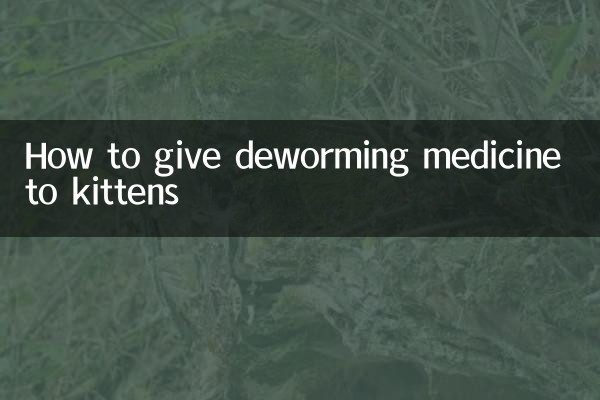How to give deworming medicine to kittens
As a pet owner, regularly deworming your kitten is one of the important measures to protect its health. However, feeding medication can be a challenge for many newbies. This article will combine the hot topics and hot content on the Internet in the past 10 days to provide you with a detailed guide to feeding medicine to help you easily complete this task.
1. Why should kittens be dewormed?

Kittens are susceptible to internal parasites (such as roundworms, tapeworms, etc.) and external parasites (such as fleas and ticks). If not dewormed in time, the kitten may suffer from malnutrition, diarrhea or even more serious health problems. The following are common parasites and their dangers:
| Parasite type | Common symptoms | Hazard |
|---|---|---|
| roundworm | Vomiting, diarrhea, abdominal swelling | Affect growth and development, leading to intestinal obstruction in severe cases |
| tapeworm | Anal itching and white proglottids in the stool | Malnutrition, which may be transmitted to humans |
| fleas | Frequent scratching, red and swollen skin | Causes dermatitis and spreads other parasites |
2. How to choose anthelmintics?
There are a variety of anthelmintics available on the market, including internal medicines, topical medicines (drops), and oral tablets. The following are the popular anthelmintic drug brands and their applicability in the past 10 days:
| brand | Type | Applicable age | Insect repellent range |
|---|---|---|---|
| Big favor | External medication (drops) | 8 weeks or more | Fleas, roundworms, hookworms, etc. |
| Bayer bug escapes | Oral tablets | more than 2 months | Roundworms, tapeworms, hookworms, etc. |
| Flynn | External medication (drops) | 8 weeks or more | fleas, ticks |
3. Detailed explanation of medication feeding steps
Feeding medicine requires patience and skill. The following are the specific steps:
1. Preparation
Make sure your kitten is relaxed by soothing it with treats or toys first. Be prepared with deworming medicine, a towel (to wrap the kitten if necessary), and a medicine feeder or spoon.
2. How to give medicine
3. Precautions
4. Frequently Asked Questions
Q: What should I do if my kitten vomits after taking deworming medicine?
A: If vomiting occurs within 1 hour after taking the medicine, it is recommended to refeed once; if it exceeds 1 hour, the medicine has usually been absorbed and there is no need to repeat it.
Q: Is it normal for a kitten to poop out worms after being dewormed?
A: This is a normal phenomenon, indicating that the drug is working. It is recommended to wear gloves when cleaning feces to avoid secondary infection.
Q: How often should I deworm?
A: It is recommended to treat kittens once a month and adult cats once every 3 months. The specific frequency needs to be adjusted according to the living environment.
5. Summary
Although feeding deworming medicine to kittens requires skills, it can be done easily as long as you master the correct method. Regular deworming is an important part of ensuring the health of your kitten. I hope this article can help you take better care of your pet!

check the details

check the details